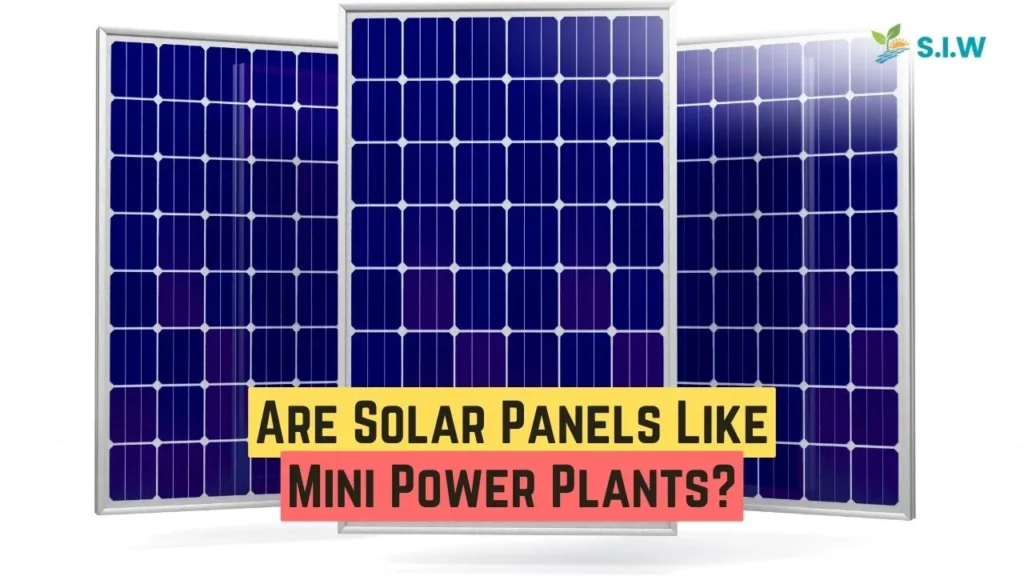Solar panels have revolutionized the way we harness energy, bringing renewable power generation to homes and businesses worldwide. But what makes solar panels comparable to mini power plants? In essence, they both generate electricity, but the scale, technology, and environmental impact differ significantly. This article delves into the similarities between solar panels and power plants, explaining how these modern energy solutions can act as small-scale energy producers.
What Are Solar Panels and How Do They Work?
Solar panels are devices made up of photovoltaic (PV) cells that convert sunlight into electrical energy. When sunlight hits these cells, it excites electrons, generating a flow of electricity. This direct current (DC) electricity is then converted into alternating current (AC) via an inverter, making it suitable for household or business use.
Unlike traditional power plants, which rely on fossil fuels, solar panels leverage a clean, renewable source of energy — the sun. The ability of solar systems to generate electricity directly at the point of use is what makes them comparable to miniature power plants.
Image: A comparison between solar panels and traditional power plants powering different structures
How Solar Panels Resemble Mini Power Plants
1. On-site Power Generation
Both solar panels and power plants generate electricity for consumption. However, while power plants serve entire regions through centralized grids, solar panels typically cater to individual properties, generating energy right where it’s needed.
- Distributed Generation: Unlike large plants, solar systems distribute power locally, minimizing transmission losses.
- Scalability: Similar to a power plant that can increase capacity, homeowners can add more panels to scale up their energy production.
2. Energy Independence and Backup Power
Just as power plants provide energy security at a macro level, solar systems offer a degree of independence at the micro level. With battery storage solutions, solar systems can provide power even during outages.
- Off-grid capabilities: Solar systems can function independently from the grid, ensuring power for remote locations.
- Hybrid Systems: Some solar setups integrate with backup generators, mirroring the redundancy built into large power plants.
Efficiency and Environmental Impact
1. Efficiency of Solar Panels vs. Traditional Power Plants
Traditional power plants achieve high efficiency levels but often lose energy in transmission. In contrast, solar panels generate electricity right at the point of consumption, improving overall efficiency despite their lower conversion rates.
- Power Plant Efficiency: Around 33-60% depending on the fuel source and technology used.
- Solar Panel Efficiency: Typically ranges between 15-22%, but with minimal transmission losses.
2. Environmental Considerations
Solar energy systems eliminate the need for fossil fuels, reducing greenhouse gas emissions and minimizing pollution. Power plants, unless renewable, contribute significantly to environmental degradation.
- Carbon Emissions: Solar systems produce zero emissions during operation, unlike coal or natural gas plants.
- Resource Sustainability: Solar is a renewable resource, while fossil fuel-based plants rely on finite resources.
Economic Benefits of Treating Solar Panels as Mini Power Plants
Solar systems not only offer energy independence but also provide financial benefits similar to how power plants generate revenue through electricity sales. Through net metering and feed-in tariffs, homeowners can sell excess solar energy back to the grid, creating an income stream.
- Reduced Energy Bills: Generating your own energy lowers reliance on the grid.
- Incentives and Rebates: Governments offer tax credits and incentives for solar installations, offsetting initial costs.
- Return on Investment (ROI): Similar to how power plants recover investments over time, solar systems pay off through energy savings.
In The End
Solar panels operate as mini power plants by generating electricity directly on-site, reducing energy costs, and contributing to a sustainable future. While they may not replace large-scale power plants, they play a crucial role in decentralizing energy production and promoting renewable energy adoption. As technology advances, the efficiency and affordability of solar systems will continue to grow, bringing us closer to a greener, more energy-independent world.
Solar energy represents a future where individuals and businesses become producers of clean power, contributing to global efforts toward sustainability—one panel at a time.








